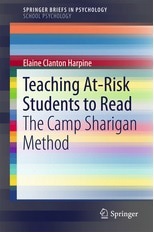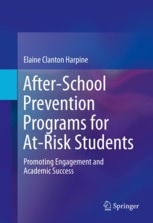There are several ways to teach phonemic awareness. At the Reading Orienteering Club (my year-long after-school program), we use vowel clustering to teach children letter sounds. This spring, we had two children move up four grade levels in reading. Three children moved up three grade levels in reading, and five children moved up two grade levels. What is the secret—the method that we use to teach? Vowel clustering. I even taught a student who had failed for 9 straight years in reading in school to read using vowel clustering. If you use the right teaching method, it is never too late for a student to learn to read. For more information on vowel clustering and how you can add vowel clustering to your after-school program, see Chapter 2 in After-School Prevention Programs for At-Risk Students (2013) or my newest book--Teaching At-Risk Students to Read (2016).
|
A community worker recently explained how excited she was that a child’s father was going to start reading to his son every evening. The child is scheduled to be sent to six grade next year, even though he cannot read at the first-grade level. I explained to the community worker that it’s wonderful when a parent chooses to sit down and read to a child, but, unfortunately, simply reading to a child will not teach that child how to read. An unfortunate misunderstanding is circulating throughout communities and schools. Some people believe that, if you read to a child or if you listen to a child read to you, then that child will learn to read. THIS IS FALSE. For a child to learn to read, that child must be taught phonemic awareness: that the letters of the alphabet represent sounds (Shaywitz 2003). Whole language or look-say methods and old-style phonics rules do not teach phonemic awareness (National Reading Panel, 2000).
There are several ways to teach phonemic awareness. At the Reading Orienteering Club (my year-long after-school program), we use vowel clustering to teach children letter sounds. This spring, we had two children move up four grade levels in reading. Three children moved up three grade levels in reading, and five children moved up two grade levels. What is the secret—the method that we use to teach? Vowel clustering. I even taught a student who had failed for 9 straight years in reading in school to read using vowel clustering. If you use the right teaching method, it is never too late for a student to learn to read. For more information on vowel clustering and how you can add vowel clustering to your after-school program, see Chapter 2 in After-School Prevention Programs for At-Risk Students (2013) or my newest book--Teaching At-Risk Students to Read (2016).
0 Comments
Leave a Reply. |
Elaine Clanton Harpine, Ph.D.Elaine is a program designer with many years of experience helping at-risk children learn to read. She earned a Ph.D. in Educational Psychology (Counseling) from the Univ. of Illinois at Urbana-Champaign. Categories |


 RSS Feed
RSS Feed
